
Doctors will strike for the first time in decades after almost a year of unsuccessful negotiations for a pay rise they are told is impossible.
But both sides of the dispute agree the impact on patient care in public hospitals should be minimal.
The NSW doctors union on Wednesday said it would continue three days of planned industrial action, defying an industrial court's orders to halt.
The rare walkout is expected to impact hospitals across NSW, with doctors in major Sydney hospitals and regional areas voting to strike from Tuesday.
Junior doctors in NSW receive the lowest base salary in the country, starting on $76,000 out of university behind Queensland's nation-leading $90,000.
The union has repeatedly rejected a 10.5 per cent increase over three years back-paid to July, instead demanding 30 per cent.
Health Minister Ryan Park said he understood doctors did not want to risk patient harm by striking.
"But what they're asking for is simply not achievable," he told reporters on Wednesday.
The minister said the one-off increase would cost more than $11 billion over four years, adding $75,000 to the annual pay packet of a middle-aged specialist doctor.
Union director Andrew Holland said doctors were striking for the first time since 1998 over unsustainable workloads, chronic under-staffing and unsafe working hours.
"The decision hasn't been taken lightly. The decision is a last resort," he told reporters outside Sydney's Royal Prince Alfred Hospital.

Intensive care specialist Behny Samadi said the strike would not endanger patients and they would understand why doctors were taking action.
"We're actually doing this for their best interest, because we want a well-functioning, sustainable public health system that treats them well," Dr Samadi said.
The union, called the Australian Salaried Medical Officers' Federation (ASMOF), expects to face fines for defying the court orders but has told members to press on to force further bargaining.
"As expressed by many thousands of members who have said they will participate ... not taking industrial action will achieve very little," Mr Holland said.
The exact form of the industrial action is still being determined.
NSW Health deputy secretary Matthew Daly told reporters an emergency operations centre was engaging with hospitals and health districts about the potential impacts, but the union was yet to advise its plans.
He urged them not to wait until the last minute to advise which doctors would strike and where.
"It could create not-insignificant threats to patient care," he said.

The government is also engaged in a prolonged industrial dispute with the state's nurses that has prompted strikes.
Mr Park partially blamed those strikes for cancelling hundreds of elective surgeries when recent data showed waitlists back above 100,000 and approaching COVID-19 peaks.
More surgery cancellations would occur with doctors on strike, he said on Wednesday.
A separate dispute with psychiatrists in the state's public hospitals is due back before the commission on Friday.
Opposition health spokeswoman Kellie Sloane said the government had lost control of a health system in chaos.
"This is a problem created by Labor having a chaotic industrial process, bargaining with everyone on different terms, giving some people substantial increases, but not doctors and nurses," she said.
Mr Park said the former coalition government's policies had suppressed wages and created the challenges the Labor government was facing.




